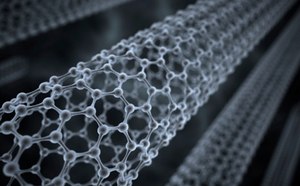Bioelectronics

Bioelectronics is a multidisciplinary field which integrates biology and electronics for diagnostic and therapeutic healthcare treatments. The regulatory activities of the nervous system can be monitored and controlled with bioelectronic technologies that affect specific molecular processes in neural signaling. Bioelectronic medicine manages a broad spectrum of diseases and disabilities, such as blindness, cardiovascular disease, diabetes, inflammatory and neurodegenerative diseases, and paralysis.
Featued Categories
A comprehensive offering of carbon nanomaterials from fullerene, to carbon nanotubes, graphene, carbon quantum dots and nanodiamonds to empower your research and development in energy storage, high performing electronics, smart composites, and novel nano therapeutics.
We offer a range of silicone materials with different molecular weights, chemical substitutes and terminal groups for use in soft lithography, surface modification, ink formulation, electronic packaging, thermal management, and biomedical applications.
We offer a comprehensive portfolio of self-assembly and nanoimprinting materials for effective target surface modification and precise transferal of micropatterns and nanopatterns to enable high-performance micro- and nanoelectronics.
Light up your research with our comprehensive portfolio of photonic and optical materials, including laser, infrared, near-infrared, chemiluminescent, photochromic, thermochromic, phthalocyanine, and porphyrin dyes, as well as photoluminescent, non-linear optical (NLO) and waveguide materials.
Bioelectronic devices function by stimulating, regulating, or even blocking specific electronic communication signals between the brain and bodily functions for personalized medical treatment. Common bioelectronic devices include cardiac pacemakers that modulate heart rate and robotic prostheses that emulate human movement. Biosensors, such as blood glucose monitors, detect enzymes, pathogens, or toxic substances. Wearable bioelectronic devices are capable of monitoring vital signs, detecting biomarkers, or harvesting epidermal energy. State-of-the-art bioelectronic implants can be powered without wires or batteries, and are minimally invasive, ingestible, and fully resorbable depending on the application.
Innovations in material design and device configurations have significantly improved the sensitivity and biocompatibility of bioelectronics. Soft, lightweight and ultra-thin materials, such as carbon nanotubes, graphene and other 2D nanomaterials, conductive polymers, gold nanoparticles, and quantum dots, are well suited for bioelectronic applications due to their excellent conductivity, flexibility, and miniature size.
For more information, read our Material Matters™ issue dedicated to bioelectronics.
Visit our document search for data sheets, certificates and technical documentation.
Related Articles
- The emerging field of printed electronics requires a suite of functional materials for applications including flexible and large-area displays, radio frequency identification tags, portable energy harvesting and storage, biomedical and environmental sensor arrays,5,6 and logic circuits.
- Professor Aran (Claremont University, USA) thoroughly discusses the engineering of graphene based materials through careful functionalization of graphene oxide, a solution processable form of graphene.
- Professor Ebrahimi and Professor Robinson (Pennsylvania State University, USA) summarize recent advances in the synthesis of these 2D materials, resulting material properties, and related applications in biosensing of neurotransmitters, metabolites, proteins, nucleic acids, bacterial cells, and heavy metals.
- The application of conducting polymers at the interface with biology is an exciting new trend in organic electronics research.
- Conducting polymers such as polyaniline, polythiophene and polyfluorenes are now much in the spotlight for their applications in organic electronics and optoelectronics.
- See All (38)
Find More Articles and Protocols
How Can We Help
In case of any questions, please submit a customer support request
or talk to our customer service team:
Email custserv@sial.com
or call +1 (800) 244-1173
Additional Support
- Calculators & Apps
Web Toolbox - science research tools and resources for analytical chemistry, life science, chemical synthesis and materials science.
- Customer Support Request
Customer support including help with orders, products, accounts, and website technical issues.
- FAQ
Explore our Frequently Asked Questions for answers to commonly asked questions about our products and services.
To continue reading please sign in or create an account.
Don't Have An Account?

